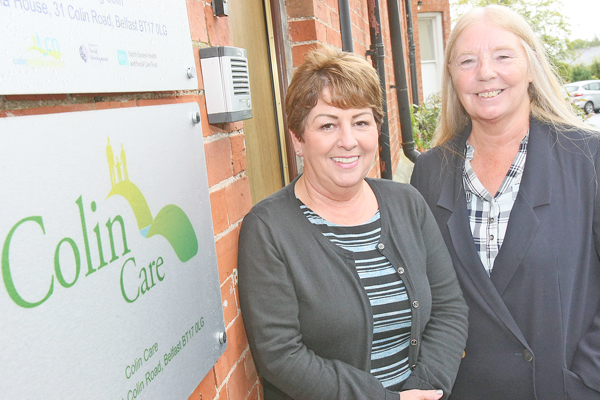THE MANAGEMENT of Colin Care – who provide assistance and personal care needs to people in their homes – have claimed that Belfast Trust’s tender process is “badly flawed”.
The Trust decided to put their domiciliary care contract out to tender last August but dramatically reduced the number of providers from 45 to just nine – effectively ruling Colin Care out of the process. There are now fears of job losses in West Belfast as a result of the decision, as well as a reduction in carers looking after local people, while people at home could now receive a reduced service or no service at all. Annie Armstrong, Neighbourhood Renewal Manager for Colin Neighbourhood Partnership, said they have provided domiciliary care services for the Belfast Trust and the South Eastern Trust since 2006.
“We are a social enterprise project, the company was set up to provide a better quality service to local people who need it and to create employment in our area.
“We saw flaws in the service that was being provided to people previously and we wanted to do it better. We also wanted to be a better employer in terms of paying good rates, sick pay and creating a pathway for people to go on and do other jobs.”
“People would be lost without our staff, the vast majority of our staff are local people. It was always about creating employment in that area where there was and still is a lack of good quality employment.”
Colin Care currently employ 80 staff members and they pride themselves on working around their staff’s busy lifestyles.
Annie said: “Through the tendering process the staff can gain employment with the people who were successful in winning the contract but the difference here is we work around our staff, we try to give them the hours that suit them in terms of childcare. I’m not sure that another employer could do that.
“We are very successful in recruitment when compared to other domiciliary care services, it’s hard work, the conditions aren’t always great and the hours can be very anti-social.
“We try to work around their needs, a lot of our employees are mothers. It can be a nightmare from a management perspective but we understand the stresses they are under”.
The staff of Colin Care go above the call of duty for their clients, Annie said.
“Most of these people can’t get out of their own homes and our carers could be the only people they see all day. They go above and beyond, especially around Christmas and holiday times.
“Our company is based in the community and we are a big organisation so much so that we can tap into other services that we have through Colin Neighbourhood Partnership. Services such as the Good Morning Service where our clients receive a phone call in the morning to make sure they’re okay. We also offer them activities.
“Someone will still be providing a service to them but it won’t be the same, they won’t have that connectivity. We have a May Ball, a Valentine’s Ball, Christmas dinners, trips to the markets and the like, other organisations won’t be able to offer this service.
“Belfast Trust need to know that there’s a ripple effect here. If we can no longer provide this service then families are put under more pressure.”
A spokesperson on behalf of the Colin Care Domicillary Management said: “We are still providing the service for Belfast Trust but that’s because they have had a number of challenges. They can’t actually issue the tender until they deal with those challenges. So we are still providing the service, but we could be notified today that we have three months to wind up.
“Having said that we have guaranteed the Trust that we will be around to the end of March.
“When a new employer is appointed they could be looking different things from employees that may no longer suit our staff, so they will then slip out of the employment market
“I would say a lot of the agencies in Belfast would find that happening. That means there will be a scarcity of carers and people will receive a reduced service or maybe no service. This means that people won’t be able to be released out of hospital beds and that’ll put pressure on A&E and someone will die at the crucial end, it’s as serious as that, the whole process needs to be rethought.”
The spokesperson added: “We are talking about people’s lives and people’s livelihoods here and the impact on the area as far as employment goes. The vast majority of our employees come from the West Belfast area.
“This is why Colin Neighbourhood Partnership was set up, it’s about neighbourhood renewal and economic development. There were jobs created that impacted on the local economy.
“We started off with two people and now we are employing 80 people. What has happened in this tender process is that the tender is likely to be awarded to employers outside of the area, what that means is that any profits will also go outside of the area.
“In our opinion the tender process was flawed, there was no social clauses and we think there should be a total rethink in what they are trying to achieve.”
A spokesperson for the Belfast Trust said: “The Trust is aware that the result of this tender process is disappointing to some of the current providers and appreciates the service that they have provided over the years to the service users.
“In line with the Public Contracts Regulations 2015, and following a public consultation, the Trust advertised a tender for domiciliary care services. The tender process consisted of a number of stages and criteria against which all tenderers were assessed resulting in the tender outcomes.
“As a result of the tender process, contracts for domiciliary care services are to be awarded on the basis that the TUPE [Transfer of Undertakings (Protection from Employment) Regulations] and the service provision change regulations will apply. This is to facilitate the transfer of existing experienced staff delivering the service and to promote continuity of care to service users. The Trust has planned a transitional period of up to 12 months to implement the new contracting arrangements on a phased basis.
“It is the Trust’s focus to continue to work in partnership with providers of domiciliary care services to deliver high quality and safe services to meet the assessed needs of service users.”





